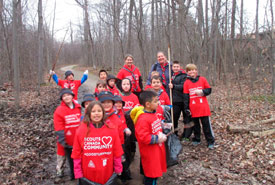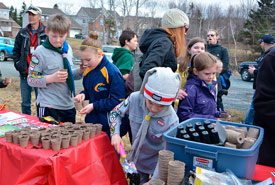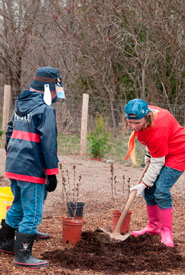Heard it from a Scout: Why it's important to promote nature stewardship among youth

Oakville Scouts hold a community cleanup during Good Turn Week. (Photo from Scouts Canada)
Nature is a magnificent thing, from waking up to the sweet sound of birds in the spring, to floating in cool, salty water on a hot, summer day, to majestic, snowy mountaintops in the winter. So much beauty can be found in nature, yet humans have a history of jeopardizing our environment and precious landscapes through development. We’ve made many changes to our planet over time without understanding fully that these transformations can have huge impacts on vital habitats and ecosystems.
So what is nature stewardship? It’s about having respect for nature and enjoying it responsibly. Canadians should promote nature stewardship because we need to keep our landscapes healthy and sustainable for future generations. If we stick with our poor habits, we’ll further damage our planet, making it a toxic place to live.

Nova Scotia Scouts planting wildflower seeds (Photo from Scouts Canada)
Today, many places in the world are already struggling with these problems. In 2011, the Government of China reported that 43 per cent of state-monitored rivers were so polluted that they were dangerous for human contact. Around half of China’s population doesn’t have safe drinking water, and two-thirds of China’s rural population (more than 500 million people) use water contaminated by human and industrial waste. Having contact with this highly polluted water can lead to many diseases, such as stomach, liver and esophageal cancers. Canadians may not be experiencing this problem now, but we should learn from these cases and ensure that we do our best to prevent this from happening in the future.
This is especially important to youth because we are our future leaders and caretakers of the planet. We need to be responsible for the environment and teach others how to respect it. Not only is Canada our home, but it’s also home to other living organisms.
There are many changes we can make to help improve the environment and minimize our carbon footprint. For example, we can be more aware of our choices and understand how they’ll affect our environment. These don’t have to big changes. Small steps, such as recycling, can make a huge difference. Did you know that recycled paper produces 73 per cent less air pollution than if it was made from raw materials? Or that glass, in most cases, is 100 per cent recyclable, yet it still ends up in landfills where it doesn’t decompose. By setting an example, we can try to make others realize the impact of their actions and how it's important to take care of the environment so that it will be around for future generations.

Scouts planting trees (Photo from Scouts Canada)
To spread the word, youth can start school clubs, such as a “Green Team.” By gathering a group of nature-minded students, you can work together to raise awareness of the importance of recycling and saving energy. Through the Green Team at my school, I had the opportunity to speak to an elementary school about recycling: why it’s important and how we can raise awareness among our friends and family.
Something else I found to be successful was organizing shoreline cleanups with my Scout group. During the summer, we go to public spaces and pick up garbage, where we meet a lot of people who are willing to help us.
At first, I thought promoting nature stewardship was a challenge. How could a teenage girl possibly raise awareness about something so big? Then I realized anything is possible if you put your mind to it.
Therefore, I challenge you with two things. The first is to make a small change toward making a positive impact in our environment. The second challenge is to spread the word of nature stewardship and explain its importance to others. Together we can help sustain the environment that we all love.
If you don’t think you can contribute to change, just remember: big things can happen from taking small steps.
"Heard it from a Scout" is written by members of Scouts Canada’s Youth Spokesperson program. This post was authored by Inaara Devsi.


